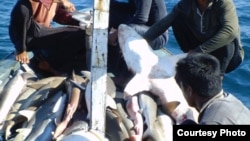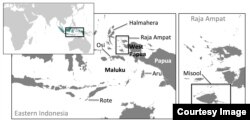The waters around eastern Indonesia are known as the "Amazon of the Seas," because of their biodiversity. They are home to the world's most diverse coral reefs and the world's largest shark fin industry, responsible for the deaths of more than three million sharks a year.
Shark fishing is the main livelihood in Indonesia's remote island communities. But shark populations have been declining sharply in recent years. That affects not just the fishermen, but also the region's ocean ecosystem and lucrative marine tourism industry.
To protect those interests, conservationists are calling for better fisheries management.
Three years ago, the Raja Ampat regency government established a shark sanctuary around its archipelago off the coast of West Papua. Marine biologist Vanessa Jaiteh, of Murdoch University in Perth, studied the impact of the ban on commercial and artisanal fishing of sharks and reef fish.
Writing in Frontiers in Marine Science she reports the shark population was up to 28 times higher in the No-Take Zones than in areas open to fishing. Reef fish were more abundant, as well.
Jaiteh and her colleagues followed up their study by talking to fishermen, who reported they moved their operations to other fishing grounds or found other means of making a living, including illegally transporting and selling fuel to local communities.
"Some of their self-initiated alternatives involve high personal or environmental risk and are hardly more sustainable than shark finning," Jaiteh said.
The authors conclude no-fishing zones will be effective only if they are part of a broader conservation strategy, which includes legal and sustainable livelihood options for those who make their living in the shark fin trade.






